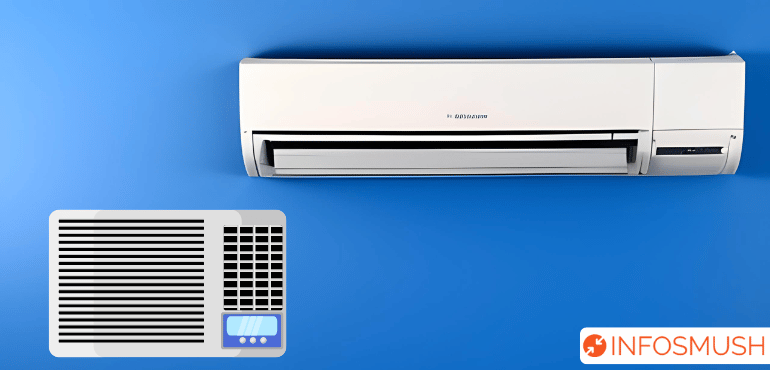When it comes to beating the summer heat, air conditioners (ACs) are our ultimate saviors. Among the different types of ACs available, window ACs and split ACs are the most popular choices for homeowners. Both of these cooling systems have their own set of advantages and considerations. In this article, we will compare window ACs and split ACs across various aspects to help you make an informed decision for your cooling needs.

Installation and Space Considerations:
Window AC: Window AC units are typically compact and designed to fit in a window frame. They are relatively easy to install as they require minimal modifications to your home. However, you need a suitable window with an electrical outlet nearby.
Split AC: Split ACs consist of two units: an indoor unit and an outdoor unit. The indoor unit is mounted on a wall, while the outdoor unit is placed outside the house. Installing a split AC involves professional assistance, as it requires drilling holes for refrigerant pipes and electrical wiring. It offers flexibility in terms of unit placement and requires minimal space inside the room.
Must Read:
Cooling Efficiency and Performance:
Window AC: Window ACs are known for their ability to provide instant cooling in a single room. The unit combines the compressor, condenser, expansion valve, and evaporator in a single package. However, they are generally more suitable for smaller spaces and may struggle to cool larger areas efficiently.
Split AC: Split ACs offer better cooling efficiency as they have separate indoor and outdoor units. The indoor unit contains the evaporator and blower, while the outdoor unit houses the compressor and condenser. This configuration allows split ACs to cool larger rooms more effectively and maintain a consistent temperature throughout the space.
Energy Efficiency:
Window AC: Window ACs are known to consume slightly more energy compared to split ACs. As they are self-contained units, they have limited insulation and may have more heat exchange with the surroundings, resulting in increased energy consumption.
Split AC: Split ACs are generally more energy-efficient due to their design. The separation of the indoor and outdoor units allows for better insulation and reduced energy loss. Additionally, split ACs often come with advanced features like inverter technology, which adjusts the compressor speed based on cooling requirements, further improving energy efficiency.
Aesthetic Appeal and Noise Level:
Window AC: Window ACs are visible from both the interior and exterior of the house. They may obstruct the view from the window and can be less aesthetically pleasing. Additionally, window ACs tend to produce more noise, as the entire unit is placed inside the room.
Split AC: Split ACs are more aesthetically appealing as only the indoor unit is visible inside the room. The sleek design and various options for wall-mounted units make them blend well with modern interiors. Furthermore, the outdoor unit dissipates noise outside the room, resulting in quieter operation indoors.
Cost Considerations:
Window AC: Window ACs are generally more affordable upfront, making them a budget-friendly option. Their simpler installation process also saves on installation costs. However, they may incur higher energy bills over time due to their relatively lower energy efficiency.
Split AC: Split ACs tend to have a higher initial cost due to the separate units and professional installation requirements. However, they offer better long-term energy savings, which can compensate for the higher upfront investment. The energy efficiency and durability of split ACs make them a cost-effective choice in the long run.
Conclusion:
Choosing between a window AC and a split AC depends on your specific requirements and circumstances. Window ACs are suitable for smaller spaces, tighter budgets, and quick installation. Split ACs are ideal for larger rooms, better aesthetics, quieter operation, and energy




I would prefer split ac due to minimum energy usage and efficiency.
Me too
They look better and I don’t have to sacrifice my window either 😂.